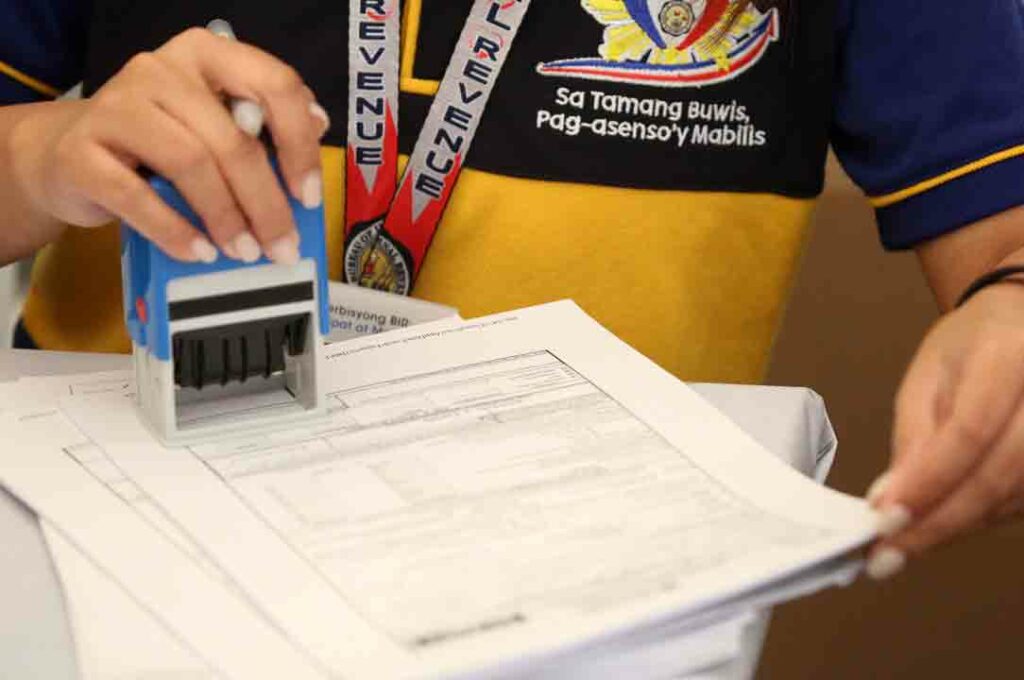




Policy Rate Updates: BSP outlook — cloudy with a chance of rate cut
 DOWNLOAD
DOWNLOAD

January Economic Update: Growth slows, prices rise
 DOWNLOAD
DOWNLOAD

Inflation Update: Up, up, and away?
 DOWNLOAD
DOWNLOAD


Budget deficit narrows in March

The National Government’s (NG) budget gap narrowed in March amid a dip in tax collection and muted spending, the Bureau of the Treasury (BTr) reported on Wednesday.
Data from the BTr showed the Philippines’ budget deficit shrank by 6.82% to PHP 195.9 billion in March from PHP 210.3 billion in the same month a year ago.
Month on month, the fiscal gap widened from the PHP 164.7-billion deficit in February.
“The NG’s budget deficit for March narrowed on the back of 11.32% year-over-year revenue growth vis-à-vis a 3.18% increase in government spending,” the BTr said in a press release.
In March, revenue collections rose by 11.32% to PHP 287.9 billion from PHP 258.7 billion last year.
Tax revenues dipped by 0.23% year on year to PHP 223.9 billion amid a decline in collections by the Bureau of Customs.
Customs revenues slumped by an annual 6.78% to PHP 74.9 billion in March, which the BTr attributed to fewer working days. The Holy Week break fell in the last week of March.
On the other hand, the Bureau of Internal Revenue (BIR) collected PHP 145.3 billion in March, up 3.11% from PHP 141 billion a year ago. Revenue from other offices jumped by 17.82% to P3.6 billion.
Nontax revenues climbed by an annual 86.94% to PHP 64.1 billion in March, as Treasury revenues more than tripled to PHP 49.1 billion.
“The significant increase for the month was primarily driven by higher dividend remittances, interest on advances from government-owned and -controlled corporations (GOCCs), specifically from the National Irrigation Administration and NG share from Philippine Amusement and Gaming Corp. income,” the BTr said.
Other offices saw a 22.71% decline in nontax revenues to PHP 15 billion, “due to last year’s one-off return of PHP 5.7 billion in unutilized unconditional cash transfer program (UCT) funds, as well as lower Malampaya proceeds for the period,” the BTr said.
Meanwhile, expenditures stood at PHP 483.8 billion in March, up by 3.18% from PHP 468.9 billion a year ago.
“While higher disbursements were recorded in departments/agencies, the growth of spending in March was weighed down by the lower subsidies to government corporations and transfers to local government units (LGUs), in particular the special shares of LGUs in the proceeds of national taxes,” the BTr said.
“The transfer of the PHP 15-billion Coco Levy Funds to the Coconut Farmers and Industry Trust Fund for this year is still expected this April; whereas last year’s release was made in March,” it added.
Primary spending — which refers to total expenditures minus interest payments — inched up by 1.2% to PHP 412.9 billion in March.
Interest payments rose by 16.5% to PHP 70.9 billion, mainly attributed to “coupon payments for domestic securities and the downward adjustments to last year’s interest payments due to premia on re-issued bonds.”
Security Bank Corp. Chief Economist Robert Dan J. Roces said that the narrower fiscal deficit in March indicates a “positive development in fiscal management.”
“This reduction could be attributed to a variety of factors, such as increased government revenues from higher tax collections and improved economic activity, and/or decreased government spending,” he said in a Viber message.
Ruben Carlo O. Asuncion, chief economist at Union Bank of the Philippines, Inc., said that the growth in revenues “bodes well” for the government’s fiscal consolidation plan.
“If revenue intake continues its uptick this year because of better economic performance, then it would not be a surprise that the fiscal consolidation plan is on track for this year,” he said in a Viber message.
WIDER Q1 DEFICIT
Meanwhile, the fiscal gap widened by 0.65% to PHP 272.6 billion in the first quarter from PHP 270.9 billion in the same period a year ago.
Data from the BTr showed revenues rose by 14.05% to PHP 933.7 billion in the January-to-March period from PHP 818.7 billion a year ago.
Tax revenues stood at PHP 820.3 billion in the three-month period, higher by 12.83% from PHP 727.1 billion.
BIR revenues climbed by 17.15% to PHP 591.8 billion while Customs collections edged higher by 2.35% to PHP 218.9 billion.
Nontax revenues jumped by 23.78% year on year to PHP 113.4 billion, as BTr revenues surged by 85.26% to PHP 72.3 billion. Revenue from other offices fell by 21.83% to PHP 41.1 billion.
Meanwhile, government spending picked up by 10.72% to PHP 1.206 trillion in the first three months from PHP 1.09 trillion in the same period in 2023.
In the first quarter, primary spending rose by 6.94% to PHP 1.013 trillion while interest payments jumped by 35.93% to PHP 193 billion.
“The slight widening of the deficit in the first quarter by 0.65% to PHP 272.6 billion from PHP 270.9 billion indicates that while there has been a month of fiscal tightening, the overall quarter still saw a marginal increase in the deficit,” Mr. Roces said.
He also noted that the slightly wider deficit in the first quarter does not mean the country’s fiscal consolidation is off track.
“Fiscal consolidation is a gradual process, and the government’s ability to manage expenditures and boost revenues in the coming quarters will be crucial to staying aligned with the consolidation goals,” he added.
This year, the government has set a budget deficit ceiling of PHP 1.48 trillion or equivalent to 5.6% of gross domestic product (GDP). It is aiming to reduce the deficit-to-GDP ratio to 3.7% by 2028. — By Luisa Maria Jacinta C. Jocson, Reporter
This article originally appeared on bworldonline.com





 By BusinessWorld
By BusinessWorld
